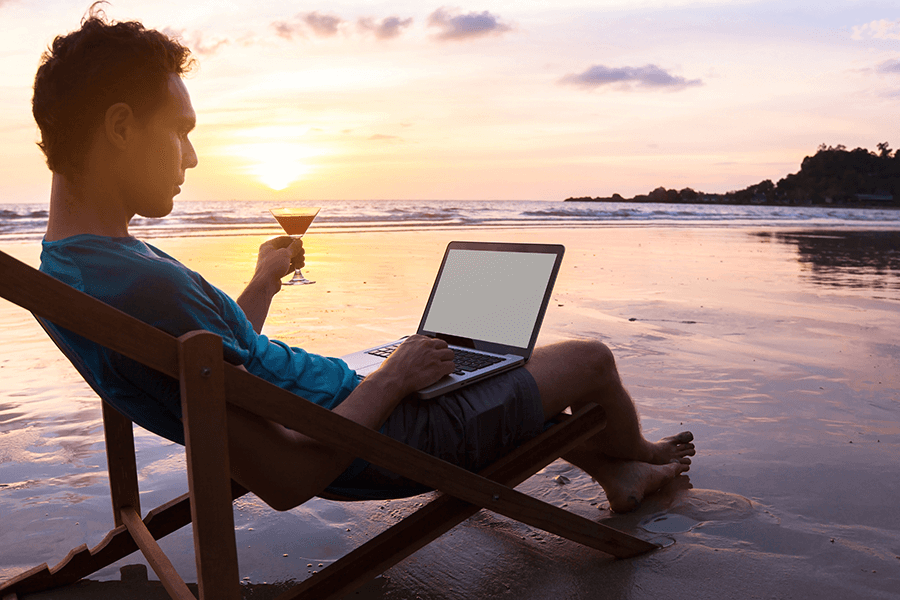
Spherical freelancer in a vacuum
If we want to find images for the query "freelance", then search engines will give us a huge number of pictures, which depict people imposingly sitting in a casual position with a laptop on the beach. This is approximately what freelance looks like in the minds of a significant number of ordinary people who have nothing to do with themselves or computers in general. Well, a person who has tried at least once to use a laptop in an open space, even in not very sunny weather, will immediately say that this is impossible. Nothing will be visible on the screen. Even if you climb into a tent made of thin fabric that perfectly transmits light. So different is the level of sunlight in a city apartment and in an open space free from city smog. And that's not to mention that the laptop is not very well suited for work.Still, it's better to have a normal keyboard and a full-fledged monitor.
There are many other problems awaiting a freelancer or a remote worker who wants to plunge into the arms of nature, while combining, as is commonly believed, incompatible - rest and work. Intrusive insects, unusual food, entertainment, lack of domestic comfort, heating, electricity, and a host of others, less obvious, but no less important in order not to feel a continuous desire to quickly return to a comfortable urban environment.
And yet, this summer (it was 2020 ...) I decided to conduct a similar experiment, the results of which I am writing this essay about. I will try to describe the most basic problems, as well as the obscure, but important nuances of existence in nature, which I had to face.
Actually, in 2012, I already lived in a tent on the island for 40 days. A laptop, solar panels and a battery were also in my household at that time, but I was not involved in freelancing yet, and did not incur financial losses due to the fact that something suddenly broke. But then I made some useful conclusions for the future. For example, about the unsuitability of a tent (even made of thick fabric) for working in it on a computer. Or about what approximately the power of solar panels is sufficient, and how many batteries are needed in order to painlessly endure periods of rainy and cloudy days.
Since I live in Vladivostok, there was no problem with the islands. At my disposal were dozens of islands - inhabited and not very, in size - from small rocky ones, without forests and fresh water, to islands on which entire villages were located. Initially, I cherished the idea of drilling on some remote rocky island with bush-type vegetation, drinking rainwater or desalinated water, if necessary. But imagining what kind of universal melancholy one could fall into after a week of such a hermit, I abandoned this idea. In addition, I came across a gorgeous description of Reinecke Island , and I decided - yes, it's time to visit this place again, where I had been before only once in 1999, when I was still at school.
Looking ahead, the description is pretty accurate. The island really has some kind of special atmosphere, on it you feel like a free person. Representatives of the law are completely absent, and, oddly enough, any types of crime dangerous for its guests.
Training
The idea of how to spend the summer came to my mind at the end of February, and I had time to purchase the necessary one at most until the beginning of July, when there is still much of summer ahead, but the water is already warming up enough so as not to feel discomfort while swimming.
The first step was to think about electricity, without which, of course, no freelancing is possible.
Being a supporter of the reasonable use of alternative sources of electricity, I immediately abandoned the rattling and gas-guzzling generators, and instead decided to use a bunch of solar panels + controller + battery. It was only necessary to determine the necessary and sufficient level of energy production. And he depended on consumption.
For work, it was planned to use a Lenovo G700 laptop with an i7 3612QM processor (TDP 35 W) and an external monitor. Unfortunately, my home 26-inch monitor with the usual resolution of 1920 x 1200 pixels was not suitable due to the unacceptably high power consumption, as well as the built-in 220 volt power supply.
Therefore, at the local Internet flea market, a 22-inch LG monitor that was written off from a Full HD regular bus was purchased with a power supply of 19 volts and a power consumption of 25 watts. Its non-detachable leg was cut by the previous owner, but it doesn't matter, there was a VESA mount, and I have long been accustomed to using a bracket, so I didn't need a leg.
Lighting - LED lamps for 12 volts, 3 watts, 3000K, in G4 format. Although I took several types of lamps, but these, in a silicone case, I can recommend as the best. The monolithic silicone body prevents the influence of dampness, the lamps themselves do not get very hot and are bright enough, and their light has a pleasant spectrum. Well, the required level of lighting can be adjusted by quantity.
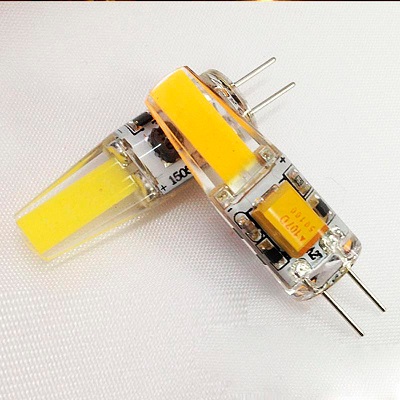
It is these bulbs that I can recommend for lighting in high humidity conditions. The
4G modem HUAWEI E8372, as it turned out, consumed very little, some miserable 1 watt. There were no more consumers, except for the charging of the smartphone, which I did not even consider.
Measurements have shown that the system consumes 50 watts on average, and only if the processor is loaded by performing some heavy task (for example, scrolling a 4k video) it grows to 80 - 100 watts.
Based on this, 2 12-volt 100 watt solar panels, a 100 Ah battery and a Chinese CM3024Z PWM controller should have done the job.
An AGM battery with a nominal capacity of 100 Ah turned up at the same flea market for only 3000 rubles, and I immediately bought it, because in a store, a similar one cost at least 15 tr. After measurements, however, it turned out that it was not as new as the seller assured, and only 62 Ah remained in it. However, they were enough for 16 hours of work with an imitation of a real load. So I decided that this would be enough. After all, the sun shines during the day, and at night you have to sleep. And 200-watt panels have a 4-fold power reserve, which will allow you to work even in cloudy weather.
Of course, as it turned out later in practice, it turned out that my calculations were overly optimistic.
As a converter from 12 to 20 volts for a laptop, some kind of Chinese car adapter was first bought for 950 r, allegedly for 100 watts. True, the very first connection showed its complete unsuitability for real work. It had such a level of pulsation at the output that the laptop speakers immediately began to squeak strangely and loudly. Fearing that the laptop would burn out, I quickly pulled out the power plug. Instead, I had to buy something more reliable, in this case it meant - not Chinese. Because all the other power adapters with different labels came in the same trapezoidal metal cases, and the reviews were very similar. In short, I had a suspicion that these trapezoidal ones are no different except for stickers.
As a result, a Robiton NB6000 120W was taken for 2000 rubles. I used a Chinese adapter to power the monitor, which, without speakers, did not give out any sounds, which calmed me down. By the way, measurements showed that Robiton also had better efficiency - the current from the battery when the monitor was running was 1.6 A, and the Chinese adapter consumed 1.84 A.
Directly for the home, of course, you could purchase an extensive tent with a high ceiling, and without doubts, I would have done so (especially at the price of very nice samples starting from 5000 r), if I didn’t know that it would be, firstly, very stuffy, and secondly, too light, even if all windows were closed ...
In addition, there is no hard floor in it, and with me I was determined to take an office chair on wheels.
Therefore, spending 15 tr. I used 40x40 beams, 3mm plywood for the roof and walls, and 8mm plywood for the table and door floor, screws, awning fabric and thick PVC film for the window. The result was a square house with 2.5 * 2.5 meters and a height of 1.8 meters.
Despite its unsightly appearance, no tent could match it in terms of comfort and reliability. True, I had to work with a saw all day.
It remains to resolve the issue of communication. I needed the internet to work, and it was on the island, but not everywhere. I had to study photographs from the terrain, and look at which of them the communication antenna from a neighboring island is visible, try to determine the height, make calculations, delve into the theory of wave propagation. In the end, I identified several places in which, in theory, there should be a good connection, and at the same time they had a number of other important advantages - convenient relief, the close presence of a stream and forest, protection from ocean waves, not too high tourist attendance.
Although the ideal is, of course, unattainable. Especially if you use Google Maps as your main source of information.
In order to feel more confident, I also purchased an all-wave panel antenna, although the distance to the communication tower was not so great - from 6 to 8 km.
First days
On July 9th I was ready to hit the road.
It was not possible to get to the island with my cargo (and it was about 400 kg) on the Moscow catamaran, so I had to use the services of an old friend from the neighboring island Popov, and on his battered boat Amur, armed with a Japanese outboard Honda, Vladivostok Lighthouse, in 50 minutes we came to Reineke Island.
The optimal place, in my opinion, on the western part of the island turned out to be inaccessible due to large boulders, which did not allow the boat to stick into the shore without serious damage to its duralumin bottom.
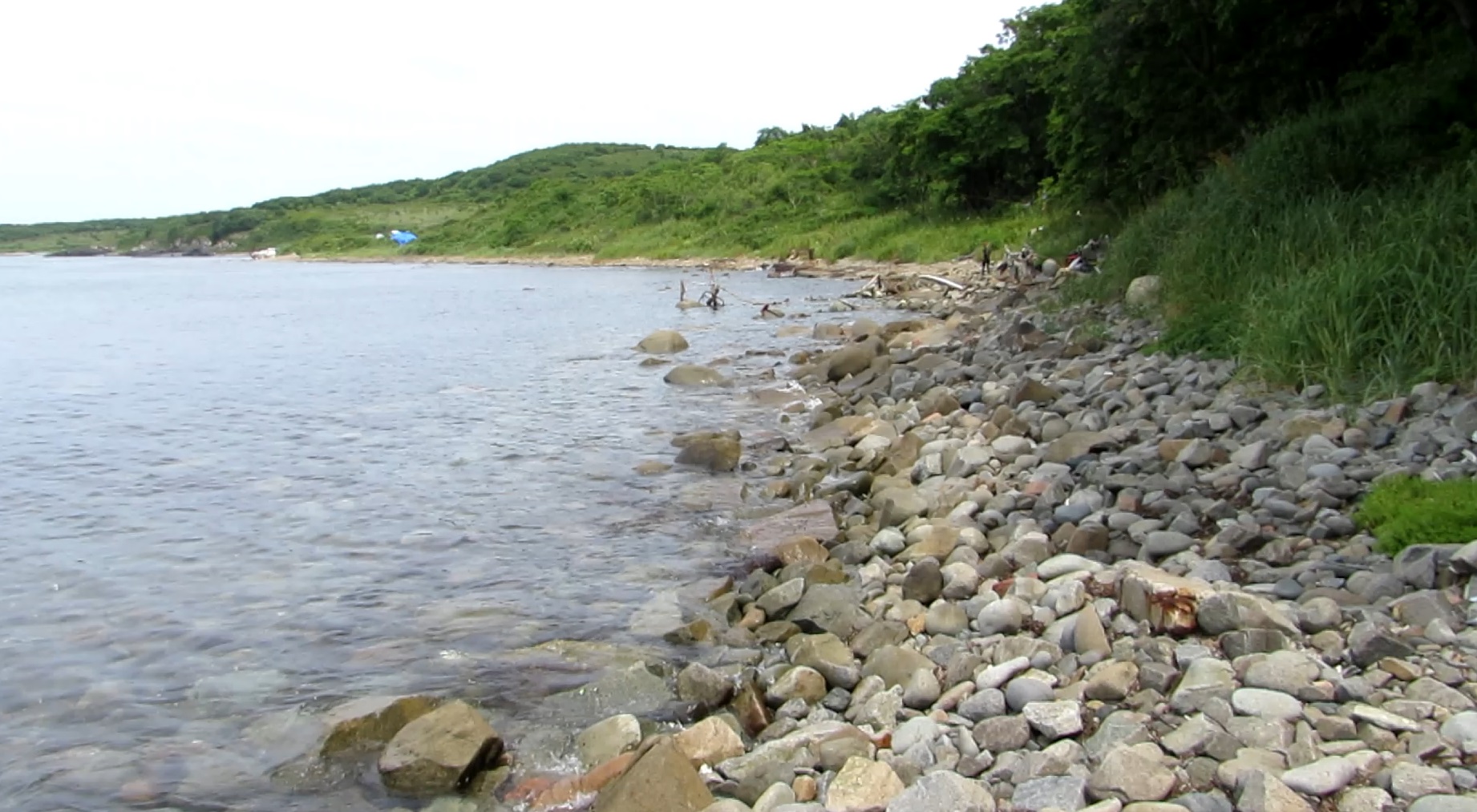
The stones on the shore are the same on the bottom. Who would have thought that this means the inability to moor close to the shore?
Therefore, we had to moor to the northern part of the island. There I could catch the Internet perfectly, even without an antenna, and the bay was closed from the southern winds. The landscape, however, was rather boring, and besides, there were a fair number of campers' tents. Even worse (unfortunately, I didn’t know it right away), starting at 6 pm, the sun was hidden by a high promontory, and the solar panels immediately began to produce several times less electricity. In fact, I was losing 3 hours of sun every day, and already from 6 pm (and not from 9, when the sun was hidden behind the horizon) the battery was working in discharge mode.
The arrangement took three days instead of the planned one, largely due to the fact that on the same day my friends arrived at the "Moscow", equipped with a fair amount of alcohol and a firm belief that it is necessary to drink in nature continuously. Therefore, instead of helping me build a dwelling, it turned out that I did everything myself, and in the evenings I helped them fight the green snake.
Ultimately, the house was built and looked something like this:
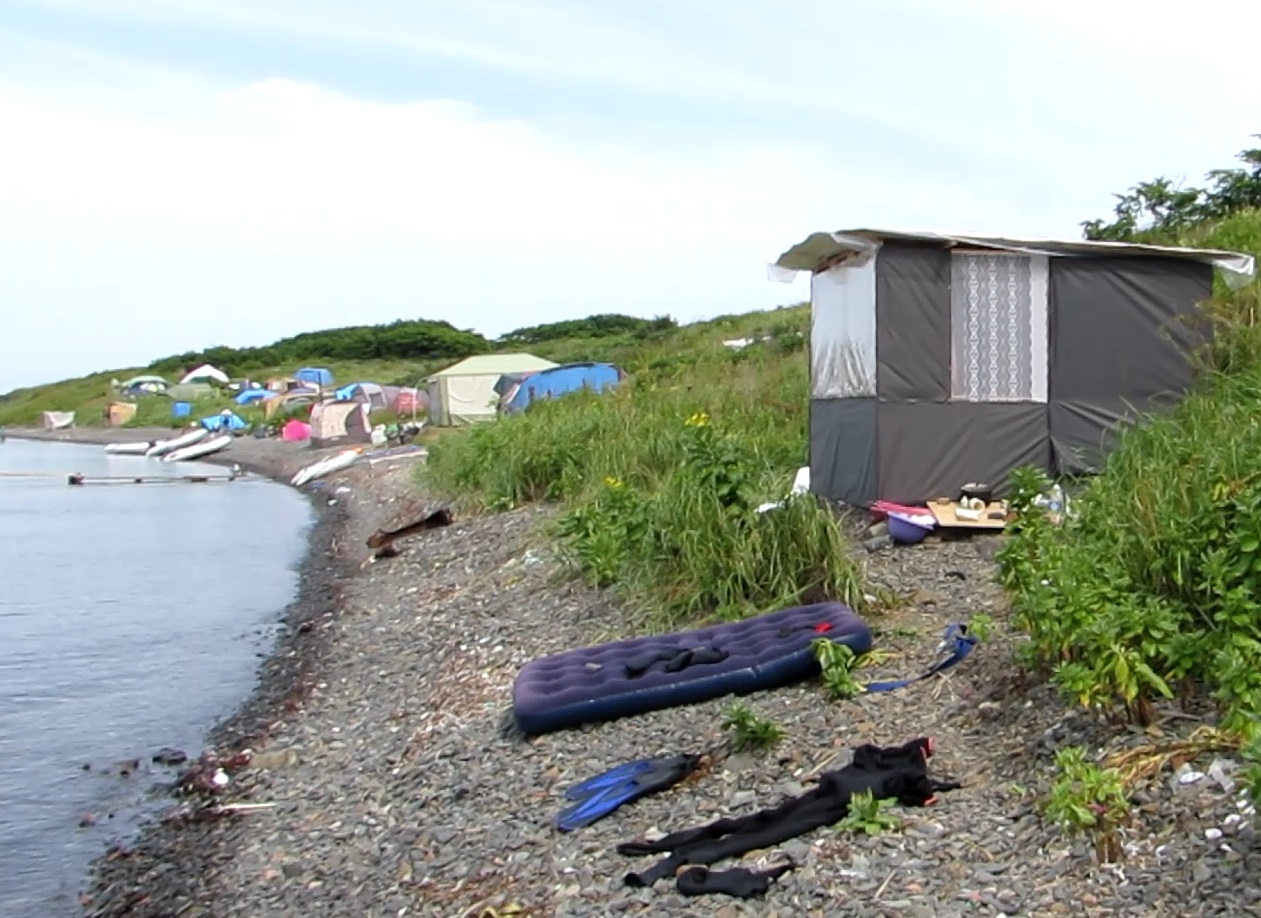
House, outside view. It turned out that I never took a photo of it, so I cut out a frame from a video taken during one of the binges. It turned out unclear, and not very aesthetically pleasing, but it gives a general idea.
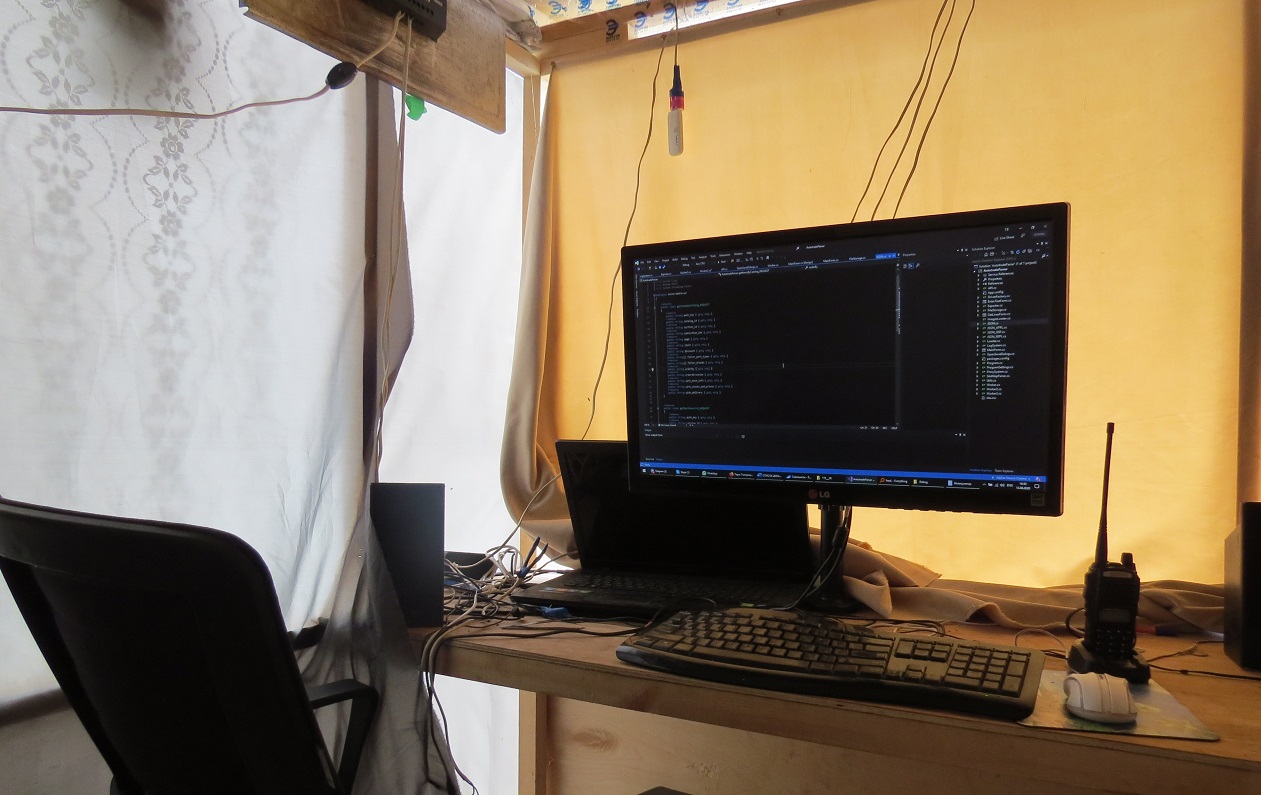
Inside view of the workplace. An all-wall window made of expensive pvc film turned out to be completely unnecessary (more precisely, it raised the illumination to an unacceptably high level), and one of the rags had to be used as a permanently hanging curtain.
After that, another week passed before my friends left and I was left alone for a while. It would seem that now nothing can prevent me from working fruitfully and breathing fresh air. But then unforeseen factors came into play.
Complexities of being
Lack of energy
In sunny or even cloudy, but not too cloudy weather, everything was wonderful. Two 100-watt panels (+ another 30-watt one) produced 15 amperes at lunchtime, that is, the maximum, and even a little more. Here I can responsibly declare - those who argue that solar panels give out their passport power only at the equator and at the height of Everest, and even when the sun is at its zenith, are wrong. Yes, Vladivostok is located at the latitude of Sochi, but still this is the middle zone, not even the subtropics. And the current received from them fully corresponded to the numbers that were written on their back side.
In general, in a day in good weather, already in the morning, in addition to a continuously working computer, the system also charged the battery from zero to 100%.
But the weather is not always good. Light cloudiness has little effect on production, but if the whole sky is covered with clouds, then this is a completely different level of illumination. The controller could show at lunchtime in the region of 2 - 3 amperes and even 1 ampere when the whole sky was covered with heavy clouds. And the laptop + the monitor consumed 3.5 amperes when idle.
If it was cloudy all day, I could only work 3 - 4 hours in the evening, waiting all day for the battery to charge. Several times it happened that the cloudy weather lasted for 2 - 3 days.
Therefore, for normal, uninterrupted operation for 12 hours a day, a typical laptop of average power + an economy monitor requires 400 watt panels, and a 150 - 200 Ah 12 volt battery.
Yes, for the most part, the system will run idle, but exactly at a time when the weather is nasty, and there is simply nothing to do except work, you will need this power reserve.
Domestic difficulties, in particular food
No, there were no problems with food. I had fins, a mask, a wetsuit, an underwater gun with me, and I could eat delicious and healthy food all day long - fish and various valuable seafood. Well, it is clear that all this was accompanied by a side dish in the form of porridge and pasta.
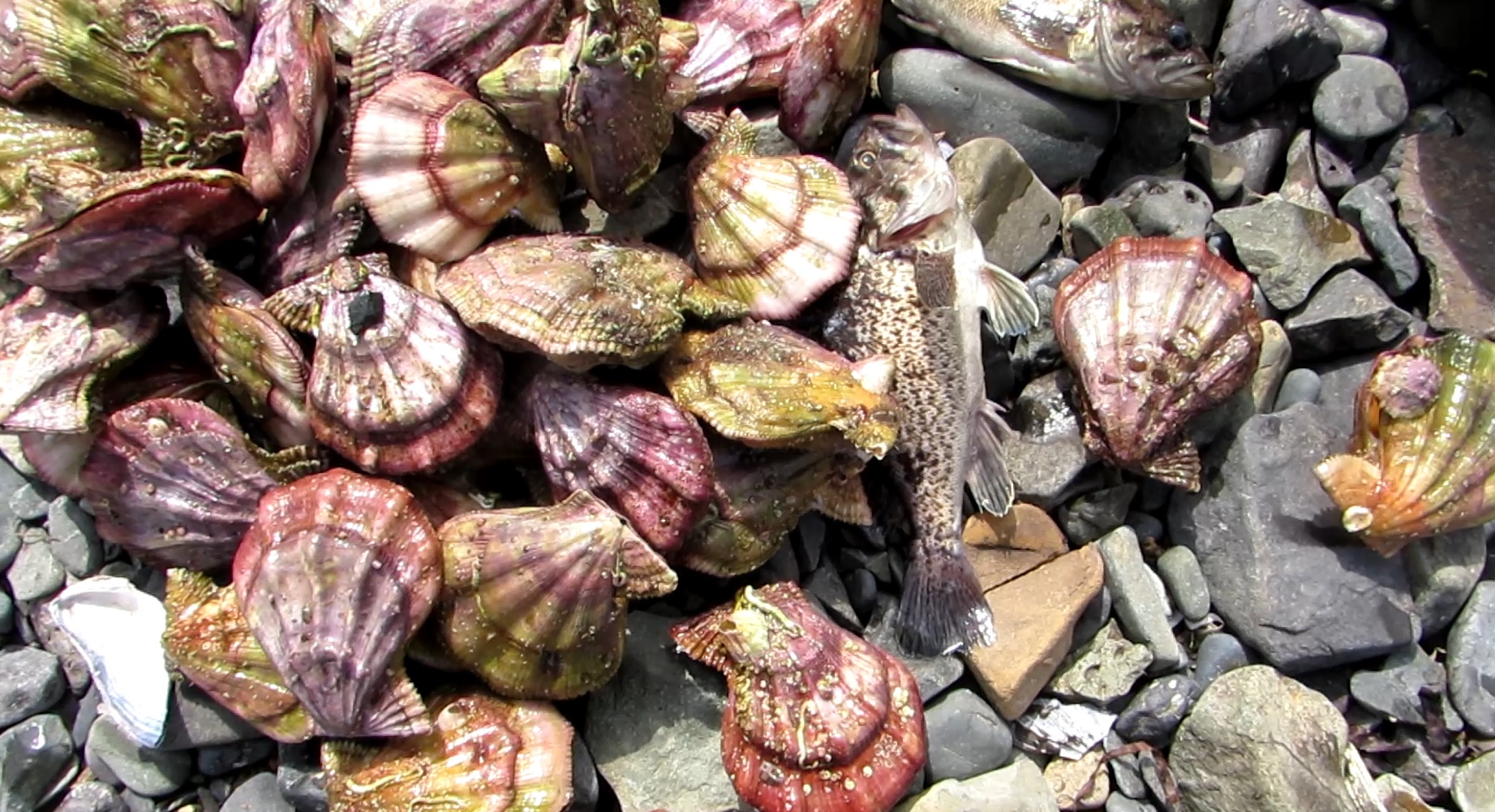
The food was tasty and healthy, but monotonous ...
The problem was that cooking took time. Namely - 6 hours a day. That is how much it took to set personal freediving records, catch, for example, scallops (these are such beautiful and tasty shells, one of the varieties of which is in the photo above), clean them, bring water from the village, go into the forest for dead wood, make a fire and wait three times until the pan blown by the wind heats up with a fire flame.
Starting at 10 am, I finished by about 4 pm, and cooked food (tea, fish / rice) lasted for 2 days. There was practically no variety of food. (But on the other hand, in 59 days I lost weight from 80 to my normal weight - 75 kg.)
After that, I needed some traditional relaxation, in the form of watching something interesting on the Internet, for example, reading the news. And only at sunset I was ready to work.
In short, I wasted 4 - 5 times more time for ordinary household needs (since, of course, there were others besides food) than in the city.
According to rumors, Lenin, in similar conditions, perfectly combined active rest and super-productive activities. Well, in this case, it remains to state the fact that I am not Lenin.
Unaccustomed environment and various factors of discomfort
If I knew in advance, I would definitely take my own chair and buy a monitor of the same diagonal as I'm used to.
It took me a month for me to stop feeling discomfort from an unusual seat and a monitor with a small diagonal.
Well, in general, it is difficult to recreate a familiar work environment in nature. Something will definitely be wrong, something will be distracting and annoying.
For example insects. In the evening they crawl through all the cracks, all these moths, spiders, wood lice, and begin to run, fly and crawl continuously. It is necessary to show increased attention to the tightness of the home in order to at least partially cope with this problem. Although over time, you get used to ...
Unreliability of technology
In a city apartment, technology works much better. First, a stable power supply from a 220 volt network and standard power supplies. Secondly, the humidity level is lower, the temperature spread is less during the day. There are no microscopic drops of salty sea water, which very quickly lead to corrosion of even seemingly "stainless" steel and, of course, all sorts of contacts.
The combination of all these factors leads to frequent breakdowns of equipment.
Well, if the technique itself is not particularly reliable, then something will surely break. For example, the Chinese laptop power adapter mentioned at the beginning of the publication broke down after 6 hours of operation after the first switch on. It just stopped working and that's it. I don't know what burned out there, but it was loaded with a monitor of only 20 watts, although the inscription "100W" proudly flaunted on it.
Fortunately, the difference in 19 and 20 volts for powering the monitor and laptop was not critical, and I connected both devices to the Robiton output. The Russian adapter turned out to be good, and did not present any surprises, it worked for 5+ the entire duration of my stay on the island.
Of the four 12 -> 5 volt converters I purchased to power the modem and charge the phone, two broke down very quickly for some reason. The remaining 2 worked fine.
The Chinese CM3024Z charge controller, after a month of operation, suddenly stopped supplying current to the output, and in addition, stopped limiting the battery charge voltage, as a result of which it boiled it well, bringing the voltage to 18 volts on a sunny day.
Analysis did not reveal burnt parts, but it was found that the power transistors did not contact the radiator at all, there was a huge gap of three millimeters. Well, it is clear that this is most likely the reason for its failure. In the future, there was almost no benefit from it, I connected the load directly to the battery, and I used the controller only to look at the current and voltage on the battery coming from the panels. When I reached 15 volts, I turned off the panels manually.
But this controller, at least from the Chinese, was not considered the worst ...
For the future, however, I concluded that China and the conditions at least somewhat close to extreme are categorically incompatible.
Around the same time, the monitor broke a little. Or maybe a laptop, I don't know, but the HDMI port in one of the devices was covered with a copper basin. Most likely due to static electricity, or maybe due to oxidation of contacts, who knows? It's a pity I didn't take a regular D-SUB cable, and I had to wait a whole week until they brought it from the city. Fortunately, when it finally arrived, I was finally able to get on with my work, as Visual Studio and a laptop screen with a resolution of 1600 x 900 pixels, in my opinion, do not fit together well.
People
On the one hand, it is boring without company, and for a long time to sit alone on the seashore, for example, I cannot. I will definitely go somewhere to look for someone to talk to.
On the other hand, all those people who will come to visit you will distract you from work, and, in general, perceive their stay on the island purely as a rest, of course, combined with abundant libations. Is it possible to look at it from the outside?
It would be ideal to find the same remote workers / freelancers, but due to the specifics of their activities, this can be quite problematic.
What could have been done better?
Firstly, as I already wrote, 400 and not 200 watts of panels, 150 - 200 Ah 12-volt AGM or gel battery instead of 62 Ah.
Secondly, the workplace. Particular attention to the monitor and chair, table height, the length to which you can stretch your legs, the location of the light sources. Everything should be the same as in your usual place of work.
Third, an energy efficient processor. The newer the generation, the better. After all, new processors have various built-in hardware decoders. And mine, when I turned on a video on YouTube, immediately began to consume 3 times more energy. And of course, the U index or at least T is welcome (if we're talking about Intel).
Yes, in a city you can afford the luxury of not paying for the "greenness" of your equipment, just at the end of the month you will receive an electricity bill for a couple of hundred rubles more, which you probably won't even notice.
But in conditions of a real power shortage, this literally means that you can work at a computer, or you will have to lie lonely under two blankets and read an e-book, periodically receiving messages from clients in instant messengers "hey, where are you there?" It’s quite funny to tell them that there is no sun, so, they say, I can’t continue working ... Mentally, I put myself in the shoes of my customers and asked myself the question - “Why do I need you so much, travel lover?”
Of course, all equipment (especially power equipment) must be from reliable manufacturers and tested in advance. And you also need to have a reserve for everything that can break. For example, I took a spare mouse, and as it turned out, not in vain, because the main mouse suddenly and decisively refused.
Water is also important. I had to hike to the village almost every day and bring 10 liters of water. There - 2 km, back - 2 km, in the heat. After that, you need to rest a little more. It would be more correct to make a system for collecting and filtering rainwater, especially with a roof of almost 10 square meters. (despite the fact that my floor area corresponded to two standard sheets of plywood 2.44 * 1.22 meters, the roof protruded significantly at the edges, this was done on purpose so that rain did not fall on the walls).
Well, to have a tap with water, at least only cold, is much more convenient than pouring it from a canister.
The same goes for the shower. A fabric outdoor shower is not the best solution.
The traditional "pioneer" fire is extremely impractical. It is good for hiking, but for constant use you need something else. There are two reasons for this. The first one is a saucepan standing on such a fire, as I already wrote, is blown by the wind and cooled (and there is almost always wind at sea), as a result, cooking takes several times longer than if there was no such wind. You can wait 2 hours for 3 liters of water to boil, if you do not immediately set a high burning rate in the style of "hell flame from which try to pull the pan". The problem can be solved with a hedge from an awning. The second reason is that pans and pans are instantly covered on it with a thick layer of soot, which gets very dirty.
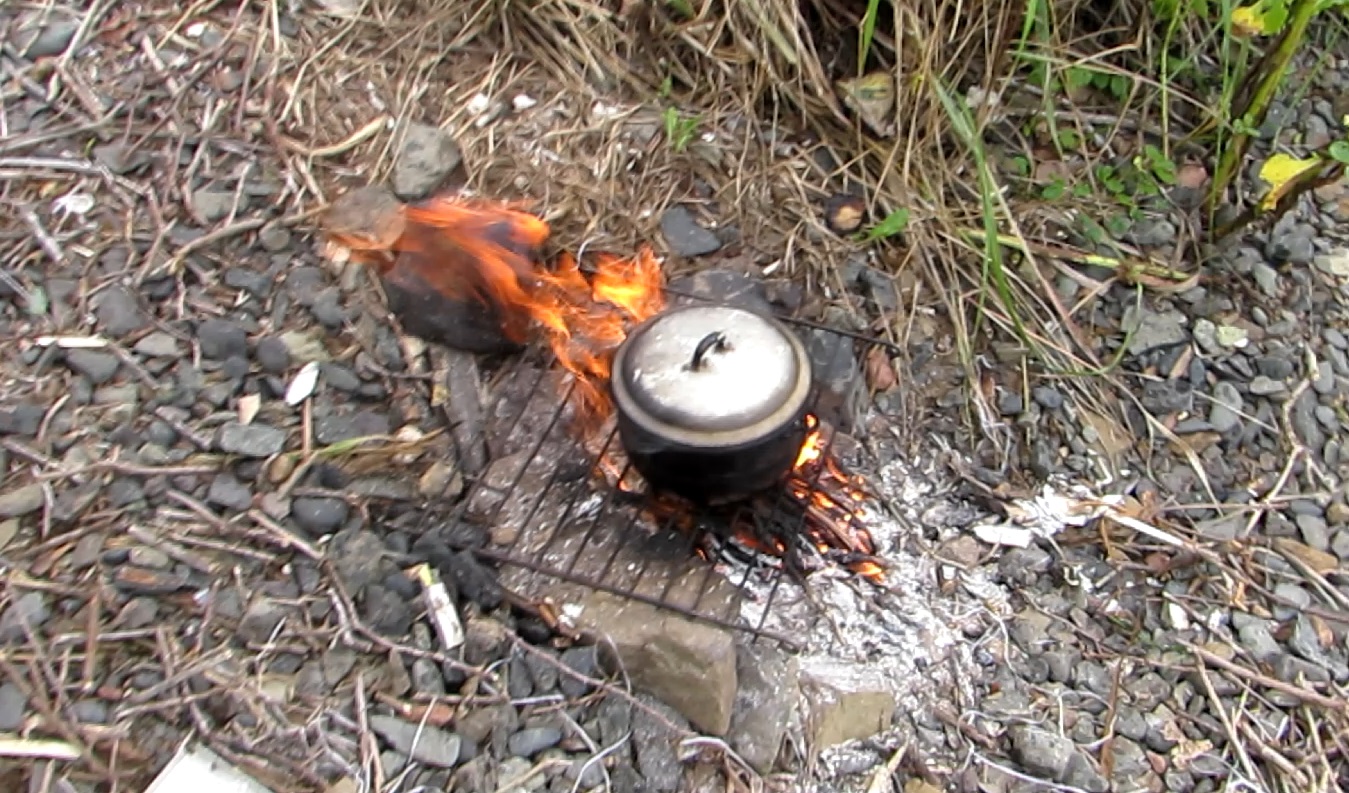
Cooking your own food this way every day for two months is very tiring ...
At the same time, it seems to me that it is conceptually incorrect to use gas in nature. There is also a forest in which there are a lot of legal dead wood, why drag cans of gas? Therefore, the ideal solution would be to use a small sheet steel stove.
Summing up, I can say that the general principle is as follows: it is necessary to bring the conditions of existence as close as possible to the usual urban ones, so that routine household operations take as little time as possible. Otherwise, most of your time will be spent on them.
About the pros and a little philosophy
If you solve everyday problems, then it is quite possible to combine work and rest. In addition, we will get an ecologically clean environment, the absence of harmful suspensions in the air, tasty and healthy (albeit not very diverse) food, sunrises in the mornings and sunsets in the evenings, meeting interesting people, and of course, the complete absence of coronavirus in the minds of ordinary people. No mask modes. For this alone, one could spend the summer on the island.
By the way, on the island I never caught a cold, although I always slept in a draft. In urban conditions, sometimes an open window is enough to catch some ARVI with complications in the form of tonsillitis. Yes, ecology is a strong factor. This is clearly not enough for the stunted city dwellers. Diseases, even chronic ones, simply disappear under the influence of iodine-saturated air and stones calcined by the summer sun, the aromas of meadow grasses leave no chance for a single microbe or virus. Perhaps it is not only this, but for example also the fact that in such conditions hidden reserves and ancient instincts awaken? Although who knows, maybe they just interfere with the usual existence in a crooked form at the computer, categorically rejecting the very idea of aimless, from their point of view, sitting and poking buttons? May be,if we can fully provide ourselves with the usual urban comfort and infrastructure, will we just deprive ourselves of the benefits of wild nature? It seems like this is obvious, because this is how it happened in the history of mankind, but maybe there is some ideal balance that is quite achievable for remote workers or freelancers at least for a while?
So far, I have not found an unequivocal answer to this question. My productivity on the island has decreased 2 - 3 times, but so far I associate this with the fact that too much time was taken up by everyday life.
Grand final
All good things come to an end, and as much as I wanted to leave the island, I had to do it even earlier than planned.
The strongest typhoon Maysak in the last half century was to blame.
Warnings of upcoming apocalypses were poured in sms from the Ministry of Emergencies throughout the summer, so I, like many others, were already used to them and did not pay any attention to them.
However, just the day before the next approaching typhoon, it became clear that it was following a rather rare trajectory, only slightly clinging to the Korean Peninsula, and almost reaching Vladivostok, almost without losing its tropical power. There was a feeling in the air of the impending revelry of the elements, unlike the previous ones. Everyone just said that about the upcoming test, it was somewhat reminiscent of the stories of Jack London, in which David Grief looked at the barometer and said "damn it, I've never seen such low pressure before."
However, the prospect of waiting out the typhoon in the house seemed boring to me, and therefore, if possible, having strengthened it from the action of wind and rain, on September 3 in the afternoon, on the very day when the typhoon finally came to our shores, I went to wander the island and get drunk with its temporary and permanent residents.
Returning already well after midnight in a not very sober state, I was surprised to find that I was suddenly flooded with a wave up to my neck (and almost carried into the sea) in a place where the waves had never reached before. This could be understood by the fact that before there were impassable thorny thickets of sea rose hips, but now they are broken and buried under the rubble of round stones from the bottom of the sea. The flashlight immediately went out and both phones in my pocket were out of order. Thus, I found myself without communication, and realized the seriousness of my situation. Somehow, limping from the injuries I received, cursing and cursing myself for stupidity and carelessness, I made my way in the dark to my camp, fearing to see only the fragments of my shelter floating in the sea.
No, the house stood still, and even the solar panels on the roof survived. What I considered the main threat - the wind, as expected, came from the south, and did not cause much damage to the buildings located in the northern bay. But then the waves, they turned out to be unexpectedly strong from all sides, and demolished all the tents on the beaches, and my house was broken through and filled up to the waist with stones. The laptop still survived, as it was on the table, but after I turned it on, another, even more powerful and high wave penetrated into the dilapidated building and the screen went out. Of course, seawater absolutely reliably destroys any electronic circuitry.
For obvious reasons, I could no longer take photos of all this horror.
That night I did not sleep (by the way, it was at this moment that I realized what information addiction is, when you cannot not only watch the news even on the Internet, but even read an offline book, at least a paper one), and the next day The sun was shining, a fresh wind was blowing, and I dug out from under the stone rubble the remains of what had not been carried into the sea.
Further stay on the island was pointless, I just had to pack my things, pick up scattered garbage, and wait for the boat to arrive to return home ...
Probably next year I will try to repeat this experiment, but at a new level, taking into account all the mistakes. Freedom and wilderness, what could be better?